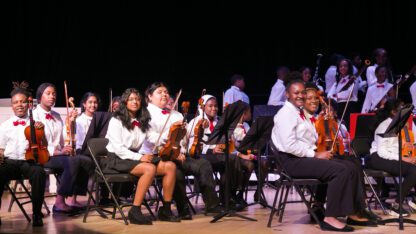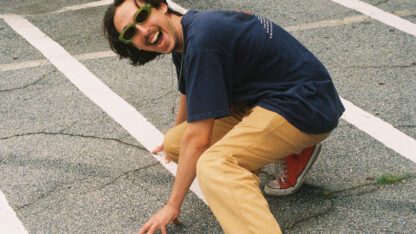Mdou Moctar's album 'Funeral For Justice' showcases the Saharan rock tradition of Assouf

Taureg guitarist Mdou Moctar is widely referred to as the “Jimi Hendrix of the Sahara.” Moctar’s fiery playing style takes its cues from a rebellious Saharan rock tradition known as Assouf, an outgrowth of nomadic Taureg musicians of the 1980s and ‘90s.
Assouf is an overtly political expression of Taureg culture, usually concerning the difficult position that many nomads find themselves in – between cycles of displacement, exile and rebellion.
Moctar’s most recent album, Funeral for Justice, was released on May 3 to universal acclaim from western media outlets. Moctar and the band’s bassist and producer Mikey Colton took some time to sit down with Jacob Smulian of “City Lights” before their upcoming tour.
This interview has been edited for clarity.
Jacob Smulian: Mdou, right after this album was recorded in 2023, Niger experienced a right wing military coup. Have you been able to go home since then?
Mdou: Yeah, it’s okay to go home. It’s not the same as the beginning for the tour. I stayed here for a long [time] because we [couldn’t] fly back home.
It was weird for us. I spent a lot of time between the United States and Sweden.
Jacob Smulian: Do you worry at all about the way that the military junta would react to your music?
Mdou: Yeah. I never support the coup. For me, the coup, I think it’s something unfair. If something like that happens, it’s better to do it diplomatically, like having a meeting and then thinking about the best solutions.
Jacob Smulian: Have you been in contact with people from the new government? Like, is that how you found out that they’re okay with your music?
Mdou: They just didn’t do anything bad to me. If they wanted to, they could do it, but they didn’t do anything. I’m scared for my family, not me.
Jacob Smulian: Funeral for Justice has struck a serious chord with American audiences, but the lyrics speak pretty directly to your people back in Niger – I’m wondering how the album has been received by the people that you know back in Niger.
Mdou: The people love what I’m saying. They feel… it’s something more heavy. And they feel it’s something heroic. Being honest. It’s like punching someone in the face.
Jacob Smulian: Mikey, you’ve played a lot of roles in Mdou’s world, and in an interview that I read recently, you mentioned that you have kind of a private language with Mdou. Could you tell me a little bit about what that entails, and how you guys communicate?
Mikey Coltun: Well, when we first started, there was a time when I was working on my French, and I was learning a little bit of Hausa, but Mdou just wants to practice English now. There’s a way that we communicate then and now that’s not necessarily spoken.We know what each other wants. We know what we’re thinking, especially on stage.
There’s this trust, this communication where Mdou can go anywhere he wants and the band is there to follow. I think it’s a really special thing. I’ve been a part of bands for years, and I think this is a very special thing that we might not come from the same culture and the same language, but we understand each other and where we want to go musically.
Jacob Smulian: I see it on stage when you guys play together. It’s kind of crazy.
Mikey Coltun: I think so too. Yeah. I’m always freaked out by it.
Jacob Smulian: It’s very… the word that comes to mind is virtuosic, but there’s something a little more communal than that. It seems a lot like the way that some of the jazz greats communicated
Mikey Coltun: I think that’s a great way to summarize it.
In the jazz world, there’s a head, there’s a B section, there’s whatever… But then there’s the improvisation, and that’s exactly what’s going on here. We don’t know where it’s gonna go. You can come see Mdou Maktar every day for 365 days a year – it’ll be completely different. We don’t know where we’re going, it’s just based on feeling and emotions.
Mdou can do whatever and signal something and we’re there. It’s a really beautiful thing.
Jacob Smulian: You’ve mentioned also that Mdou and the band operate differently. differently than any band you’ve ever worked with. Could you speak a little bit about what those differences might be?
Mikey Coltun: There’s a vernacular within the Tuareg structure that’s different from any other music that I’ve played. I grew up playing a lot of punk, rock, jazz, and also spent time playing West African music from Mali. It’s very different from Tuareg music, which is unique. If you go to a Tuareg wedding in Niger, there’s a call and response, a solo. There’s a certain way to kind of play around it.
But there are also certain nuances with Mdou’s music that I gravitated towards. There’s this way of playing maybe five times instead of four times that I really like – that – when I talk to him about it, he’s like,
“what are you talking about? I’m playing it normally.”
And it’s like, Oh, you don’t realize that’s the special thing about you that I really like. So I try to bring that out for him.
Jacob Smulian: It’s a deep emotional language. And, I mean, you guys are entering into the conversation with him as he engages with it. How do you feel like you bring your punk background into playing with Mdou?
Mikey Coltun: I first went to Niger in 2017 with Mdou, and I was there for a little over a month. Mdou and I played about three weddings a day and he would just drop me off at weddings and I would just kind of sit in with those bands. It was a great boot camp, but one of the big things that I learned is that the energy is so similar to punk music or the DIY culture that I grew up in.
I grew up doing generator shows as well. They’re DIY shows. Everyone’s helping out. And so, you know, as a producer, it wasn’t about bringing this new sound to the music. It was about bringing out the roots of this music. I’m not trying to change anything stylistically. It is energetic, and it is super raw, and it is very familiar.
Jacob Smulian: It’s something that I’ve seen you do very proficiently across the last couple albums. It was interesting to watch the transformation of the recording spaces that you guys recorded in – going from a traditional studio to just renting out a house and being like, “we’re just going to make this happen and it’s going to be like a show, but without the audience.”
Mikey Coltun: Yep. It’s about finding a comfort zone for them. I feel very fortunate to be at a skill level where myself and my mixing engineer that I work with, Seth Manchester, are able to fix anything. We’re able to make it work. Just hit record and it’ll work. Capture what’s there. I don’t have any interest in making Mdou, Akhmadu, or Suleiman uncomfortable.
So if it’s about renting a house that has no furniture, and we’re all sleeping on the floor together, and we’re all cooking together, just how we do in Niger, that’s what we’re going to do.
Jacob Smulian: That creates a kind of kinship, it sounds like. Again, a sense of community that seems like it just fosters that music.
Mikey Coltun: Yeah, that’s the most important thing for Mdou. The Tuareg people are always together. We can be anywhere in the world and a Tuareg shows up, and they might not know the Tuareg, but they’re family. They come backstage, they eat with us, they stay with us. It’s a community and it’s a family, and that’s what we try to bring out on the records.
It’s a party. Kind of similar to like, you listen to a Sly and the Family Stone record, where it just feels like a party. That’s what I’m trying to bring out. This energy of sitting around the fire, cooking, eating, talking.
Jacob Smulian: To your credit as a producer, I think you’ve done a really good job. It feels like that. One more question, then I’ll let you guys go. Do you guys listen to anybody else’s music while you’re on the road? And if so, who? You want to answer that?
Mdou: Yeah, we listen to a lot of different musicians.
We listen to Jimi Hendrix sometimes. Especially his song, “Hey Joe”. We listen to Eddie Van Halen sometimes. And then in Africa, we listen to Uma Sangere. We listen to some, uh, different musicians like Tinariwen, some local musicians as well.
Mikey Coltun: The band of Gypsies, the Hendrix record, is kind of a big one that we listen to a lot in the van.
There’s a bunch of field recordings that we’ve done, that we’ve recorded, or that we have on our phones of local Tacomba musicians. That’s something that we listen to a lot.








